 It’s not uncommon to feel like you’re being treated “like family” when you’re at Mercy, but there are three doctors in Northwest Arkansas who take that “family” thing pretty literally.
It’s not uncommon to feel like you’re being treated “like family” when you’re at Mercy, but there are three doctors in Northwest Arkansas who take that “family” thing pretty literally.
Meet Dr. Larry Weathers, Dr. Lance Weathers and Dr. Tiffany Weathers — a father/son/daughter team of specialists at Mercy whose bonds are not only biological but professional, too.
Since it’s so unusual to find three doctors in one family working for the same health provider, today we’re taking a look at the family dynamics in this trio of specialists in Northwest Arkansas.
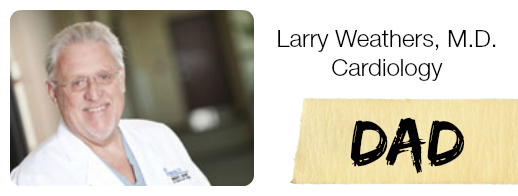 What is it like to have your kids turn into work colleagues?
What is it like to have your kids turn into work colleagues?
It is fun watching them be great physicians!
Did anything in their childhood make you think that your kids might be destined for a career in medicine?
No, other than they were exposed to medicine as little children. They were in the clinic after school and they made rounds with me in hospital on the weekends.
 What’s the one thing you wish more people knew that would help them improve their heart health or keep it healthy long-term?
What’s the one thing you wish more people knew that would help them improve their heart health or keep it healthy long-term?
Medical studies have found that there’s a link between how flexible you are and your risk of heart disease. So stay as flexible as a 2, 3, 4, 5, 6, and 7-year-old child.
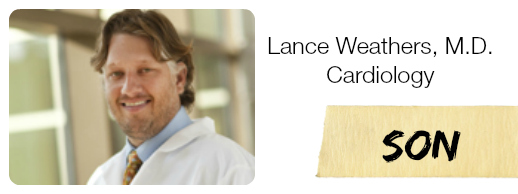 How did your dad’s career influence your decision to go into medicine? What was it about his work that fascinated you?
How did your dad’s career influence your decision to go into medicine? What was it about his work that fascinated you?
I was always with him as a kid. I used to wake up on Saturdays and go sit in his truck while he made rounds. I spent a lot of time playing with echo machines, heart models, and stethoscopes — probably not normal toys for a kid. 🙂 I know those experiences probably had to influence my fascination.
What are family dinners like at your house with 3 doctors at the table? Do you “talk shop” or do you leave the medicine at the clinic?
Mom doesn’t like cell phones or “doctor talk” at the table. We usually talk sports (Razorbacks, of course) or we talk about the grand-kids.
My office is on the same hall as my dad’s office, which is a very unique situation in cardiology. There are not many father and son combinations in this field of medicine.
What would an ideal day at work look like for you?
Make a difference with one person. It’s the starfish approach. But you never know which one it’s going to be!
What new medical advancements in cardiology do you get most excited about?
That’s what drew me to cardiology — the ever-changing technology. And cardiology really does change daily.
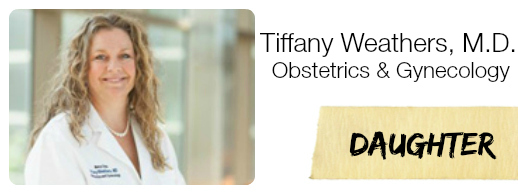 How did your dad’s career influence your decision to go into medicine? What was it about his work that interested you?
How did your dad’s career influence your decision to go into medicine? What was it about his work that interested you?
Basically, if I wanted to spend time with my Dad growing up, I went to make rounds or went to the Cath lab with him. I met the families when he would make rounds and I saw that he was making a difference. He has the most amazing work ethic I’ve ever seen, and his bedside manner with patients is so kind and calming.
With a father and a brother in cardiology, what was it about gynecology and obstetrics that drew you into that specialty versus cardiology?
I think that with Cardiology, people either have poor genetics and/or poor habits that cause them to have heart disease. Most of the time when my Dad was called to see them, they were dying. It was difficult for me to cope with people dying everyday. No matter what you do, people die from heart attacks. I have the utmost respect for my father and brother. They both have amazing hands in the Cath lab.
Obstetrics and gynecology drew me in because I was able to assist with bringing life into the world. It’s such an amazing honor.
What do you wish more pregnant women understood about pregnancy and/or childbirth?
I wish more women would discuss questions with their doctors and not believe all of the information they see on blogs on the Internet.
Being pregnant is actually a 9-month “adaptation period” where your body is expected to perform and develop another human with major hemodynamic changes. You have an increase in cardiac output, sodium and water retention, leading to blood volume expansion, with reductions in systemic vascular resistance and systemic blood pressure. This enables optimal growth for the fetus and protects the mother from hemorrhage, complications and death.
Young healthy women without any medical problems usually do well. The problem is that there are diseases of pregnancy such as pre-eclammpsia, for example, that we as doctors still don’t fully understand. Pre-eclampsia can happen to anyone and has major complications that can lead to seizures, stroke and ultimately death. It’s also a disease that can happen within the “blink of an eye.”
What are the advantages of having three doctors in the family? Would your other family members say that there are any drawbacks of having three doctors in the family?
It’s an honor to work together at Mercy because we often share patients and we can discuss difficult clinical cases.
It’s also beneficial to have people that understand how difficult it is to practice medicine and try to maintain a healthy work-life balance. We sacrifice a great deal of things for this profession and many times our own families do not come first. This is probably why I don’t know many families that have three physicians who are all currently still practicing medicine.
Our thanks to Drs. Larry, Lance and Tiffany Weathers for answering our questions and for their continued service to patients throughout Northwest Arkansas.
To contact Dr. Larry Weathers or Dr. Lance Weathers, call the Cardiology clinic at 479-338-4400. To contact Dr. Tiffany Weathers, call the Women’s Clinic at 479-338-4000. Click HERE to visit the Mercy website.

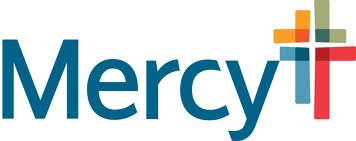
Found the article on FB about the Weathers’s, had the pleasure of working with Dr. Larry Weathers in Searcy and it was a my honor to have gotten to work with him. Searcy loss a good Dr. when he left, and Northwest Arkansas gained one. Good to see you doing so good and to be there with the family is great for you.